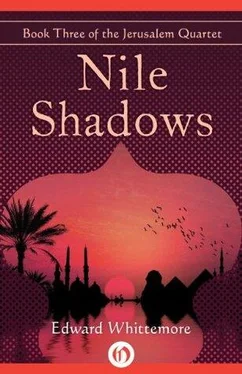I don't think so, said Joe.
Alice sighed.
Nor do I, she said, and Belle doesn't either. But what she's asking in her delicate way, Joe, is this. What if it meant your life?
I know that's what she's asking, and the answer has to be the same. I came to Cairo to find out about Stern, that's all.
But why is that so all-important to you?
Because he deserves it. Because the end is coming for him and he deserves a witness to the truth of his life.
But why? Why do you feel that so strongly?
Because he's explored the human soul more deeply than anyone I've ever known. Because his life looks like nothing but failure, and I can't accept that without knowing it to be true. Because long ago in Smyrna during the massacres, deep in the night that began our age of genocide, I watched him pull back the head of a dying little girl and slit her throat, and that moment has forever haunted me. Because unless there's some meaning in his life, I can't see where there would ever be any meaning anywhere.
And does there have to be? asked Belle.
No.
For you or for anyone?
No.
Do you feel it's our right, just because we were born?
No. But I feel we should seek it.
And yet you yourself, Joe, find Stern's life to be a chaotic tapestry. And in such a vast network of colors and threads and souls and strivings, what can you expect to find?
Nothing perhaps.
But if you did find out. . about him, what would it tell you?
It might begin to tell me what life is, and how it should be lived.
Belle stared at him and then she turned away to gaze through the open French doors at the river. Alice had also turned away and was looking out at the river, and again there was silence in the strange room so crowded with ghostly wicker chairs, the dozens and dozens of pale shadowy shapes drifting with the reflections of the stars off the water, airily floating in the soft yellow glow of the few candles that still burned in memory of other eras, dimly now and low with the late hour.
And it's decided now, thought Joe. The weaving's done and they know what they're going to say or not say to protect the rare fragile thing they cherish.
It was Alice whose small voice finally broke the silence. Little Alice gazing at the river and speaking quietly in the stillness.
How hard we try, she murmured. How hard we try.
***
The two ancient women seemed far away, lost in thought. Abruptly Belle's knitting needles clicked once.
All right, she said. All right, young Joe, you'll have what you want to know. But whatever we tell you now is for Stern's sake. It doesn't concern the war, not this war or any war, because we have nothing to do with such things. So for Stern's sake, then, because we love him and because he's always been like a son to us, and there's no limit to that kind of love.
Belle paused, her hands holding her knitting. Alice sat erect, watching her.
Over the years, said Belle, we've known many people from many lands who have come to tarry here in the course of their restless journeys and be touched by the timelessness of the place. And there's nothing new about that, people have always done that. Alexander the Great stopped here, wondering whether he might recognize something, before setting out to reshape the world. But it was already a tradition by then and long before young Alexander there had been visitors in search of man's past, his nature, come to view the enigmatic pyramids and the enigmatic Sphinx and the great river that gives life in the desert. A Greek word, enigma. A riddle, something obscure. Do you know the origins of the word?
No, said Joe.
It means to speak darkly, murmured Little Alice. To speak allusively. And the root of that is the Greek word for a tale.
Yes, said Belle. Oddly enough, the ancient Greeks had the idea that such was the nature of an account of life. To recite a tale, to speak of life, was to speak darkly because the essentials forever lay just beyond the clear light of the mind, tempting and allusive and beyond. To them, a tale was felt and experienced and its truths were known that way. But a tale could never be reduced through recitation to mere landscapes and seascapes and other topographies of the soul, however mighty, however brilliant the telling of it. Nor could the shadows and the echoes of a tale be removed in the speaking of it.
Belle studied Joe.
By chance, we know the name of their first great teller of tales, don't we? Or at least time and tradition have assigned a name to this blind man who would otherwise be anonymous, who must have sat in the dust of some wayside recounting what he had overheard from the din raised by those who passed him by, or what he imagined he had overheard. And curiously enough, since you mention Smyrna, it was that very same ancient Greek city in Asia Minor where this obscure blind man was said to have been born.
Blind Homer seeing deeply behind his dead eyes, seeing brilliantly in the dust of the wayside through the perpetual shadows of his mind. Homer's blind eyes at play for all time on the dancing glittering seascapes, on the hard unyielding landscapes of the ancient world where others passed him by on their journeys, passed him by while imagining they sailed and strived in the clear white light of their days. When in fact he was the one who saw the journey, not them, because he was blind and they had only lived it.
And that ancient Greek image of blind Homer seeing more than the great heroes of whom he spoke, seeing more than those who have eyes, is an enigma in itself. And as an enigma it whispers to us and hints at things and suggests far more than we might want to acknowledge readily, and it remains an enigma untouched by millennia, no less of a truth today and yet no more resolvable than it was then, three thousand years ago. An enigma as dark and allusive and true, still, as it ever was. And with that we are brought to the code you now look for in Cairo.
Belle paused, gazing at Joe.
Today? This century? Stern? A sudden unexplained trip to Poland just before the war broke out? A priceless breakthrough?
Enigma, she said, is the name of the code machine used by the Germans. Just before the war broke out, a Polish intelligence service acquired one of these machines. Stern learned of its existence through contacts and he knew the machine had to be turned over to the British before Poland fell. Consequently, he went to Poland at once and there were hectic clandestine meetings in Warsaw that finally resulted in the most important meeting of all, held in a secret signals-intelligence post buried underground in the Pyry forest, a concrete bunker referred to as the house in the woods. Stern wasn't at that final meeting himself, but he played some part in arranging it. Just what part I can't tell you, because Alice and I don't know that. In addition to the Poles at the meeting there were three men from London, two of them professional experts in cryptology. The third man from London, an observer rather than a participant, was there in the guise of a professor from Oxford.
Joe was listening intently, deep in thought.
He knits, said Joe suddenly.
Both Belle and Alice stared at him.
What's that? asked Belle, startled.
Joe looked confused, embarrassed. He had spoken as if from a trance. Now he passed his hand over the side of his face, a nervous gesture, as if he were brushing something away. Even as he made the movement with his hand, he realized it was something he had seen both Liffy and Cohen do in the last few days.
Do you know about this? asked Belle.
No, none of it, said Joe quickly. A thought just came to me, that's all. I'm sorry I interrupted you, I didn't mean to.
Who knits? asked Belle, curious all at once.
Читать дальше












